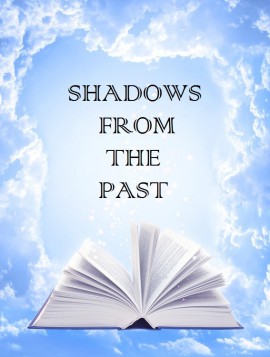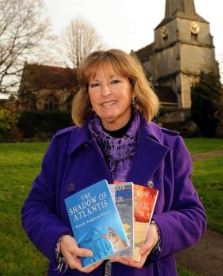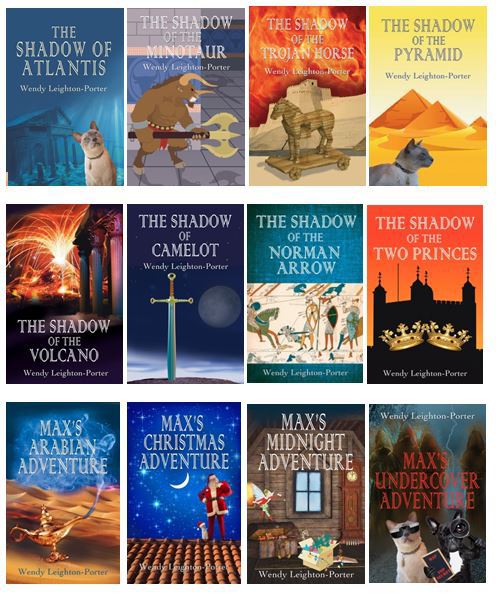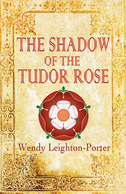|
Wendy Leighton-Porter spent twenty years as a teacher of French, Latin and Classical studies in the UK, before a change of career led her to writing books for children instead. She currently divides her time between homes in South West France and Abu Dhabi in the UAE. She lives with her husband and their beautiful Tonkinese cat. I met Wendy a couple of months back on a visit to the ‘Wanna Read?’ offices in Abu Dhabi where I volunteer. 'Wanna Read?' is an NGO that believes in ‘healing through reading’ founded by Sheikha Shamma bint Sultan Bin Khalifa Al Nahyan who is also the owner of the ‘Royal Publishing House’ in Abu Dhabi where Wendy currently volunteers to manage Sheikha Shamma’s own series of books. Wendy is the internationally-selling author of the SHADOWS FROM THE PAST series - exciting time-travel adventure stories aimed at children over eight-years-old. The first book in the series, ‘The Shadow of Atlantis’, debuted in 2011 and since then Max, the talking Tonkinese cat (writer of his own mini-blog), and his three young friends (ten-year-old twins Jemima & Joe, and their friend Charlie) have been on various adventures travelling through different times in the world’s history. To date there have been 13 published adventures with two more scheduled for release in the very near future. Here she talks to BookFabulous on how she began writing children's books as well as some tips for budding writers... The beginning… ‘I always wanted to write a book and when I stopped teaching in the UK, I no longer had the excuse that I had no time. But then I had a moment of panic about what I wanted to write about. I knew I wanted to write for children because I had always taught children, and I still liked the idea of educating even though I was no longer in the classroom. ‘It all started when I was traveling on an airplane and had a couple of hours to think. I knew I wanted to write a series. By the time the plane landed, I’d worked out my characters and what the basic premise of the book was about and how it would happen. ‘They usually say to write about what you know. Since I was teaching Latin and Classical studies, I decided I would begin my stories set in the ancient past, in the famous of all ancient places, Atlantis. I then had the idea of a talking cat because I had a cat that I loved. On the ‘Shadows from the Past’ series… ‘This is an ongoing series. I am probably half way through. I have published 13 in total although 9 of them are really full-length, standalone books, because occasionally I’ll write a little off-shoot story (4 mini adventures) where Max (the cat) has an adventure on his own although his adventures in a way tie in with the series. All the books in the series could be read as standalone books if one wanted to do that and not read them in order, though really they make more sense when read consecutively. ‘I probably have 9 more full length stories to write and I already know what they are going to be. I know where my series is going to end and how it’s going to end and I know each stopping point along the way and titles for these books because they are time travel stories and they started back in Ancient history in Atlantis and they’re gradually moving forward in time. So the one that I’ve just written is set in the 16th century (at the printer’s) and includes people like Shakespeare and Queen Elizabeth I of England. On Max … the talking cat! 'He’s quite an extraordinary cat and he’s got quite a real character. And in fact he is the character that children love and I’m pleased about that because he’s the character that I love too. Max really has developed into a hero and with each passing story where he takes more and more of an active role he’s very funny. Thanks to a charm on his collar he’s able to talk and understand what’s being said to him so he often helps the children on their travels. 'Max is in fact my cat. Unfortunately the real cat passed away last year but he was 16. He’d had a good life. So all the descriptions of him in the book and the things people say about him in the book are things that people have in the past said about the real Max.' On writing … ‘I always have a basic framework although I don’t stick rigidly to it. I know everyone writes in a different way. Some people have to have absolutely every detail planned. Personally, I prefer to start out with an idea of how I’d like my book to end and then I decide basic ideas on how it will go along after which I fill the missing gaps as I go along. I often get ideas as I’m writing. So often as I’m writing I’ll suddenly go off on a tangent and things will occur to me in the process of writing. And I’m fine with that. In fact as I wrote the books the characters grew in ways that I didn’t expect them to as they took on different personalities that I hadn’t necessarily planned for them’. On setting… 'The series takes the three children and their cat on time travel adventures that start in Ancient Atlantis. ‘Another,’ explains Wendy is set in Egypt in the time of Tutankhamen and there’s an ancient Pompeii one because ‘when I used to teach Latin, I taught about Pompeii. As I’ve moved into more recent history, the stories are about the [British] history that I know. Although having said that, and without giving too much away, the cast will be travelling further afield for a couple of other adventures; There is going to be one set in France during the revolution, and the last book will not end in England. 'Funnily enough, before even coming to the UAE, I set Max’s Arabian Adventure out here in the Empty Quarter (al rub al khali). It’s really a little bit like Aladdin’s tale with the magic lamp and the magician and along the way he meets a falcon and a camel who help him'. On editing… ‘It used to take me about three months to write a book. But since I came out to Abu Dhabi and got involved with all the things that I do out here, it is taking me about 18 months to complete a book because I have to try and fit in writing in quiet times when I’m not doing other things. I go through three drafts before I’m satisfied with the work mainly because I’m finicky about grammar having been a teacher. Then I normally have at least two, maybe three proofreaders go over it because you never see your own mistakes. So you need other pairs of eyes and every work does need to be edited before it goes to print. ‘My husband also edits for me and he is ruthless. He always looks at it and says ‘Adjectives, adverbs, cut them all out!’ He writes thrillers and so writes in a totally different style and I always say to him that for children you need to paint a picture so you need more description. So I slip them back in when he’s not looking. But when other people are correcting me and usually write me that this doesn’t work or that I’ve got a plot hole there or that I’m repeating myself, I do take note. Any author has to accept being edited.’ ‘If English is not your first language but feel you can only write in English then make sure you get a native speaker to edit and proofread your work to make sure your writing isn’t stilted and is written in a natural flow of English. I think often when a work is translated as well, if you don’t have a good translator it can end up reading in a strange way. I was given a book to proofread that was written by a Norwegian writer who translated it into English themselves, and it was full of really literal translations of phrases and idioms that meant nothing in English’. On reading…
‘I read everything and I always have a book on the go. I love historical and detective fiction. When it comes to children’s books, every time I find that people are talking about a particular author that is current or really good, I download their book and I read it. I think it is something that is important to keep up with what’s around for kids. And there is so much good stuff out there’. On e-reading… ‘I have been reading on a kindle since I moved out here to Abu Dhabi because it’s practical but I still prefer the feel and of course the smell of a real book. Back at home I have a library, which is actually a very wide corridor along the length of which are books from floor to ceiling. I see bookshops as magical places; I can spend hours in them. ‘Although my books are published in the UK, they are all available in e-format on Kindle. To bring them in to the UAE is not terribly easy because I have to get them shipped over and that is the expensive bit. I am looking into though.’ On Royal Publishing House... ‘When I met Sheikha Shamma bint Sultan bin Khalifa al Nahyan, also a children author, she had just set up the Royal Publishing House and had released her first book ‘The Lost Princess’. Gradually as I got to know her and she realized that I was involved in writing and publishing with my own books, she asked for my help. So, I am sort of running the publishing house now but on a voluntary basis. But it does take up most of my time and it’s lovely because a life filled with books is what I enjoy.’ On advice for budding writers … ‘We’ve all started at that stage with having never written and it is very daunting when you sit down for the first time in front of a blank computer screen or a blank piece of paper and think ‘can I do it?’ But you’ll never know until you do. They always say ‘Everyone’s got a book in them!’ and I think that having the idea is the most important thing and once you’ve got that just go for it. You don’t have to have a degree in writing to write. I don’t. Anyone can write. When I look back at what I first wrote, I think ‘ooh it wasn’t terribly good’ but you learn to polish as you go along. ‘Another thing is that I always keep a notebook so that when I get ideas I jot them down before I forget them. 'Back at home, before coming here I had my own nice office where I wrote but here in Abu Dhabi, I have to work anywhere although I do need to have peace and quiet although I know other writers who can only write to music. Everybody is different. So I don’t think that there is any hard and fast rule or magic formula for writing. It’s just about going with what suits you.’
0 Comments
Leave a Reply. |





 RSS Feed
RSS Feed
